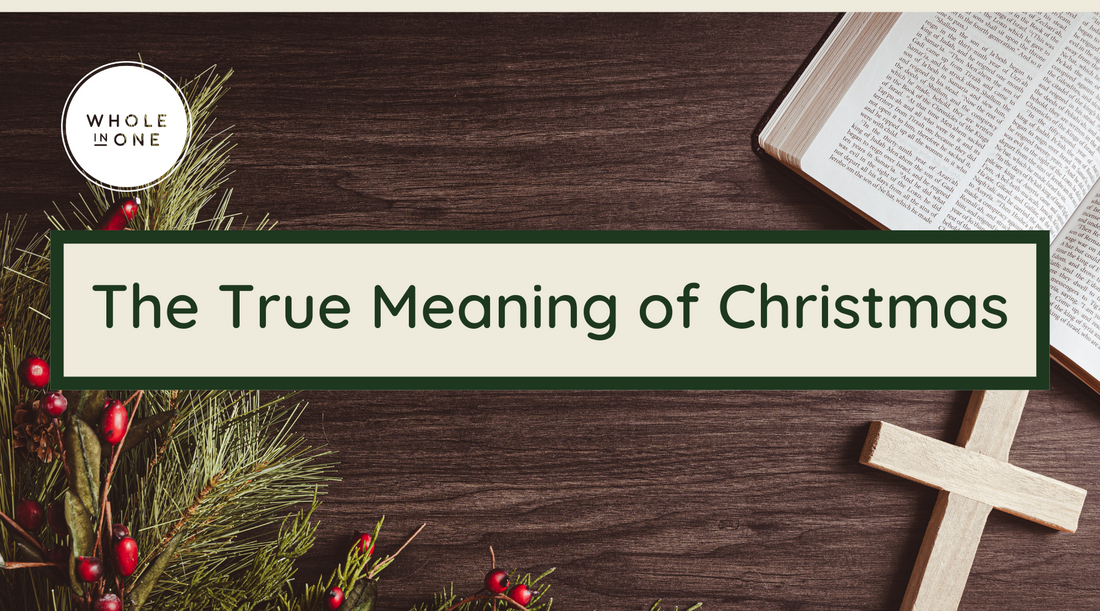Beyond the commercial hustle and bustle, the true meaning of Christmas is steeped in a profound sense of love, that is reflective of the mission and life of Jesus Christ. The season, marked with a distinctive cheer and warmth, calls us to pause and reflect on this underlying truth. Played out in countless family gatherings, acts of kindness, and moments of reflection, the essence of Christmas transcends the material.
What is Christmas?
The Celebration of Jesus Christ's Birth
Christmas is all about celebrating Jesus Christ's birth. The name 'Christmas' actually comes from a religious event called the Mass of Christ. It is where Christians honor Jesus's sacrifice and resurrection. It's this same ritual that gave us our much-loved midnight mass tradition on Christmas Eve.
Essentially, it’s a moment for believers to come together in joyous celebration while reflecting deeply on Jesus’ life and teachings.
More Than Just a Holiday
Christmas is not just about celebrating Christ's birth. It's about acknowledging God's plan for redemption. By sending His Son to earth, God initiated a plan to reconcile humanity to Himself. This plan is a central theme of Christmas, and the birth of Jesus is the first step in this incredible act of love (John 3:16).

The Story of Christmas: Biblical Narratives
The Biblical Account of Jesus' Birth
Old Testament Prophecies Foretelling the Messiah
The story of Christmas, as told in the Bible, kicks off with prophetic revelations mentioned in the Old Testament. These predictions acted like heavenly assurances signaling that a Messiah was coming—the chosen one to save mankind. Central prophecies, especially those penned down in Isaiah and Micah, laid the groundwork for Jesus's birth narrative.
The Prophecy of Immanuel in Isaiah
The prophecy in the Book of Isaiah, specifically 7:14, stands out as it shares God's promise. It says "Look out for a sign from the Lord himself; a virgin will conceive and give birth to a son named Immanuel."
The Prophecy of Bethlehem in Micah
Micah 5:2 further specifies the birthplace of the Messiah, stating, "But you, Bethlehem Ephrathah, though you are small among the clans of Judah, out of you will come for me one who will be ruler over Israel, whose origins are from of old, from ancient times."
The Nativity Story in the Gospels of Matthew and Luke
Matthew and Luke's Gospels tell the tale of prophecies coming true with Jesus Christ's miraculous birth to Virgin Mary in a humble Bethlehem stable. The essence of Christmas is captured through an angelic revelation to shepherds, who then go on spreading this joy-filled news far and wide.
Jesus as the Savior: Fulfillment of God's Promise
At the core of the Christmas narrative is this concept: Jesus, acting as our Savior, was born to deliver on God's salvation promise. His arrival, a key element in a divine strategy kicking off from Genesis 3:14-15, symbolizes God's unwavering love for us all. He was sent with one mission in mind - to free humanity from sin.
This concept of redemption highlights the spiritual significance of Christmas. It calls us to reflect on the grace bestowed upon us and respond by radiating love and kindness to others. The true meaning of Christmas is not just about a historical event, but about the transformation it inspires in our hearts.
The Birth of Jesus: A Spiritual Event
The Journey to Bethlehem and Jesus' Birth in a Manger

The Christmas story is fundamentally anchored in Mary and Joseph's trip to Bethlehem for Jesus' birth. Triggered by Caesar Augustus' decree for a Roman world census, they left their Nazareth home and set off towards the city of David, Bethlehem.
"In those days Caesar Augustus issued a decree that a census should be taken of the entire Roman world. (This was the first census that took place while Quirinius was governor of Syria.) And everyone went to their own town to register" (Luke 2).
Even though Mary was about to give birth, they still braved the tough trip. But when they got there, all the inns were packed - no place for them at all. So Jesus had his humble beginnings, born in a simple stable and cradled in a manger.
"While they were there, the time came for the baby to be born, and she gave birth to her firstborn, a son. She wrapped him in cloths and placed him in a manger because there was no guest room available for them"
Luke 2:6-7
"While they were there, the time came for the baby to be born, and she gave birth to her firstborn, a son. She wrapped him in cloths and placed him in a manger because there was no guest room available for them".
(Luke 2:6-7)
Therefore, Jesus being born in a humble stable highlights the Christmas message of simplicity and humility.
The Spiritual Meaning of Jesus' Birth
The birth of Jesus is a big deal—not just some old story. God was saying he wanted to join our lives by making Jesus one of us. Jesus feels our highs and lows and guide us back to him. This gives us a new view of Jesus as both our Savior and the promised King, hand-picked by God.
The Good News of Christmas and the Gift of Salvation

The Announcement of Hope and Joy
The good news of Christmas is the message of hope, love, and salvation that Jesus' birth brings to the world. His arrival signifies God's unending love for humanity and his willingness to offer us redemption from sin. This message is encapsulated in the angel's announcement to the shepherds on the night of Jesus' birth, as recorded in Luke 2:10-11.
Jesus as the Pathway to Salvation
As the Savior, Jesus gives believers a way to be saved from sin and live forever. This idea is so key to the Christmas story. Jesus being born shows he opens the door for people to be rescued from the punishment of sin.
Reflecting on the Divine Gift of Salvation
The birth of Jesus is like a heartfelt present from God, who let His one and only son step into our world, face our struggles, and in the end, endure suffering on the cross for us to be saved. So Christmas becomes a time to appreciate this heavenly gift of rescue - an occasion to ponder over God's deep love and live in a way that respects His giving spirit.
Contemplating the Depth of God's Love
The true meaning of Christmas extends beyond the festivities and gift-giving. It invites us to contemplate the depth of God's love, as expressed in 1 John 4:9-10, embrace the promise of salvation, and reflect these truths in our actions by showing love and kindness to others.
Understanding the Spiritual Aspect of Christmas
The Essence of Christmas in Christian Theology
The spiritual meaning of Christmas goes way deeper than just parties and gifts. For Christians, it's about how God showed His love for us by sending Jesus. It represents the promise of salvation, eternal life, and a future of peace and justice. So while the festivities are fun, remembering the spiritual side helps us grasp the true meaning of the Christmas season.
The Transformative Power of the Christmas Message
The transformative power of the Christmas message is immense in the lives of believers. The story of God becoming man, dwelling among us, and offering salvation, provides a profound source of comfort and hope. It underscores the concept of grace, the unmerited favor of God, which bestows upon believers the promise of eternal life.
Living the Christmas Message
This transformative power is not just a theme of the Christmas season, but an ongoing, daily experience that shapes a believer's life. It inspires followers of Christ to model their lives after His teachings, promoting values such as love, forgiveness, generosity, and humility.
Spiritual Reflection and Renewal at Christmas
Understanding the spiritual aspect of Christmas allows believers to truly appreciate the depth of God's love and the grace offered through Jesus Christ. Recognising this deeper significance can add a profound dimension to Christmas celebrations, turning them into a time of spiritual reflection, gratitude, and renewal.
Prayers and Reflections for the Christmas Season
During the Christmas season, prayers serve as a powerful medium for connecting with the divine, expressing gratitude, and reflecting on the profound spiritual significance of the occasion. Here are some suggestions for Christmas prayers and their respective focus:
- Prayer of Thanksgiving: A prayer of gratitude can focus on expressing heartfelt thanks for the gift of Jesus Christ, symbolising God's boundless love and the promise of salvation. This prayer can include expressions of thankfulness for God's grace, mercy, and the spiritual growth experienced over the past year.
- Prayer for Loved Ones: A prayer focusing on loved ones can include petitions for their health, happiness, and spiritual growth. It can also include requests for peace, love, and unity within the family and among friends.
- Prayer for the World: This prayer can focus on the global community, expressing hope for peace, justice, and love to prevail around the world. It can also include petitions for those suffering due to conflict, poverty, or disease.
- Prayer for Personal Growth: A personal prayer can reflect on personal spiritual growth, expressing hope and commitment to embodying Christ's teachings more fully in the year to come.
Christmas isn't just about festive cheer; it's a chance to ponder and express gratitude. You can look back at the year, remembering both good times and challenges, all while seeing how you've been guided along the way. This season is perfect for introspection and setting spiritual goals for next year. Plus, we get to appreciate the love shown through Jesus Christ anew. We commit ourselves once again to living out his lessons of kindness, forgiveness, and love.
Celebrating Christ at Christmas: A Journey Beyond the Festivities

As the Christmas season unfolds, let's journey beyond the surface celebrations. Let's rediscover the true meaning at its heart: the birth of Christ. This period calls for a reflection on and practice of the deep-seated values of love, peace, hope, and joy that Christ himself embodied and taught. That is the true meaning of Christmas!

